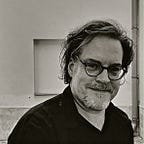William Parker: Free Jazz and Soul Grooves
Review: WOOD FLUTE SONGS: ANTHOLOGY/LIVE, 2006–2012 (Aum Fidelity)
By Bradley Bambarger <2014>
Hallelujah for beautifully produced objets d’art in the age of the virtual — particularly when they’re devoted to living artists and not just bygone icons. The eight-CD boxed set Wood Flute Songs: Anthology/Live, 2006–2012 (AUM Fidelity) encapsulates the protean spirit of William Parker, bassist, composer-poet and leader of multiple bands on the New York scene. Totaling some nine hours of multi-track concert recordings, the richly annotated set attests to the 61-year-old Parker’s ability to invoke both “the history and the mystery,” as he describes the living art of jazz. The Bronx native played extensively in groups led by Cecil Taylor and David S. Ware, but he has grown increasingly prolific as a leader over the past two decades. A majority of Parker’s compositions in this box are making their debut on record, with some rivaling his previous best. His music breathes the air of Ornette Coleman and Curtis Mayfield, Beat-era Marrakesh and the Caribbean; it’s free jazz and medina wails, soul grooves and psychedelic lyricism.
This set has at its core the William Parker Quartet, founded in 2000 and featuring alto saxophonist Rob Brown, trumpeter Lewis Barnes and drummer Hamid Drake. Wood Flute Songs includes two double-disc live documents of the band — one recorded at Yoshi’s in Oakland in 2006, the other the next year in Houston at DiverseWorks. Both shows brim with ensemble invention, the instruments entwining as second nature. One of today’s most underrated altoists, Brown is the group’s prime mover of emotional energy, particularly at full cry. Barnes’ horn glints with silvery incisiveness, while Drake is a drummer of heavy-hitting physicality, all roiling polyrhythms and African/island accents. If not as lithe as some, Parker’s bass playing throbs with sinewy phrasing and old-wood tone, driving the band through the strength of his imagination.
Highlights from the quartet’s Oakland concert include a fantastical 43-minute sequence of “Alphaville” / “Daughter’s Joy” / “Golden Bell.” From the Houston gig, there’s a great version of the tune-rich swinger “O’Neal’s Porch,” plus “Red Desert” — where Parker makes like a tripping muezzin as he plays a gralla, an archaic double-reed instrument that here evokes Naked Lunch as much as The Sheltering Sky.
Augmented by shamanistic pianist Cooper-Moore, the Parker quartet morphs into the latest incarnation of his quintet In Order To Survive. The band’s powerhouse show at the 2012 Vision Festival in New York was captured for this box. Parker calls Cooper-Moore a player “full of the blues and African funk,” and that description suits the band as a whole, with an admixture of noir lament on “Theme for Rondo Hatton.”
Another Parker band expanded from the core quartet is Raining On The Moon, which adds pianist Eri Yamamoto and deep-soul vocalist Leena Conquest. This set’s 2012 live recording of all-new material from Montreal starts with “3+3 = Jackie McLean,” a sublime folk-jazz homage not only to the titular alto hero but to Sidney Bechet, Willie “The Lion” Smith, Zora Neale Hurston and the legacy of Harlem. When Conquest delivers such lines as “bring him his horn, let him blow strong” in her proud, clear, golden-hued voice, she taps a bottomless well of feeling. “For Abbey Lincoln” and the nostalgic “Sweet Breeze” are further stunners, with Parker’s melodies fit to charm snakes.
Hardcore avant-improv fans will be drawn to the album showcasing a one-off septet with Parker’s quartet joined by violinist Billy Bang, cornetist Bobby Bradford and alto-sax vet James Spaulding, taped at Vision Fest in 2009. Bang brought his “Alabama magic,” as Parker puts it, to an untamed take on “Wood Flute Song,” the bassist’s singing, dancing tribute to Don Cherry. The box’s remaining disc documents a 2011 concert at Switzerland’s AMR Festival where the quartet became the Creation Ensemble when enlarged by four saxophones, second trumpet, bass clarinet, additional double-bass and voice. The arrangements are exciting, even if vocalist Ernie Odoom’s rough brand of expressivity won’t be for everyone. That show’s heart is “Psalm for Billy Bang,” written for the mortally ill fiddler, who passed just five days after the concert.
(Originally published in the February 2014 issue of DownBeat magazine.)
